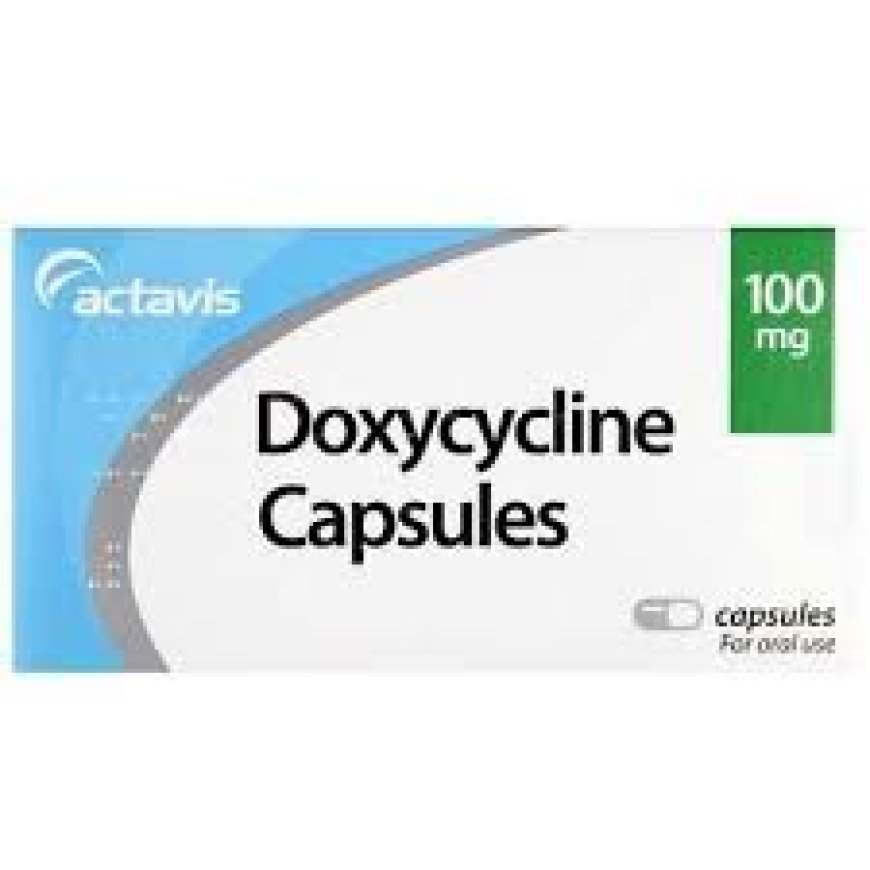How Doxycycline 100mg Fights UTI-Causing Bacteria
Thankfully, antibiotics like Doxycycline 100mg have proven highly effective in combating the bacteria responsible for these infections. But how exactly does this medication work, and why is it considered a top choice in certain UTI cases?

Urinary tract infections (UTIs) are among the most common bacterial infections, affecting millions of people worldwide each year. The burning sensation, frequent urination, and abdominal pain can be frustrating and painful. Thankfully, antibiotics like Doxycycline monohydrate 100 mghave proven highly effective in combating the bacteria responsible for these infections. But how exactly does this medication work, and why is it considered a top choice in certain UTI cases?
This article explores the science behind Doxycycline, how it fights UTI-causing bacteria, its effectiveness, usage guidelines, and why it might be the right choice for you or someone dealing with a stubborn urinary infection.
What is a UTI?
A urinary tract infection (UTI) occurs when bacteria enter the urinary system, which includes the kidneys, bladder, ureters, and urethra. While UTIs can affect any part of the urinary tract, bladder infections (cystitis) and urethral infections (urethritis) are the most common.
Common UTI Symptoms:
-
Burning sensation during urination
-
Increased frequency or urgency of urination
-
Cloudy or foul-smelling urine
-
Pelvic or lower abdominal pain
-
Blood in urine (hematuria)
Though more common in women, UTIs also affect men and children and can become severe if left untreated.
What Causes UTIs?
Bacterial invasion is the root cause of most UTIs. The most common culprits include:
-
Escherichia coli (E. coli) responsible for around 80-90% of UTIs
-
Klebsiella
-
Proteus
-
Enterococcus
-
Staphylococcus saprophyticus
-
Mycoplasma and Ureaplasma species (less common but often treated with doxycycline)
While first-line antibiotics like nitrofurantoin or trimethoprim-sulfamethoxazole are often used, Doxycycline 100mg is particularly useful for treating infections caused by atypical bacteria, or when other antibiotics fail.
What is Doxycycline 100mg?
Doxycycline is a broad-spectrum tetracycline antibiotic thats been widely used for decades. It is effective against a wide variety of bacterial pathogens and is commonly used for treating respiratory infections, acne, sexually transmitted infections, and certain UTIs.
How It Works:
Doxycycline works by inhibiting bacterial protein synthesis. It binds to the 30S subunit of bacterial ribosomes, preventing the bacteria from producing the proteins they need to grow and multiply. Without these proteins, bacteria cannot thrive, allowing the bodys immune system to eliminate the infection.
How Doxycycline Targets UTI-Causing Bacteria
Doxycycline is bacteriostatic, meaning it doesnt kill bacteria directly but stops them from multiplying. Heres how it fights UTI-causing bacteria:
-
Prevents Protein Synthesis
Bacteria need proteins to function and reproduce. Doxycycline blocks this vital process, making it impossible for bacteria to sustain themselves. -
Targets a Broad Spectrum of Bacteria
It is especially effective against gram-positive and gram-negative bacteria, including strains responsible for more complicated UTIs, such as:-
Chlamydia trachomatis
-
Mycoplasma hominis
-
Ureaplasma urealyticum
-
-
Useful in Recurrent or Resistant UTIs
In some recurrent or antibiotic-resistant UTIs, where traditional antibiotics fail, Doxycycline provides a reliable alternative. -
Penetrates Deep into Tissues
Its known for its excellent tissue penetration, which helps it fight infections not just in the bladder but also in the urethra and kidneys if necessary.
When is Doxycycline Recommended for UTIs?
Doxycycline is typically not the first-line treatment for uncomplicated UTIs but is often used in these cases:
-
UTIs caused by sexually transmitted bacteria (like Chlamydia or Ureaplasma)
-
Persistent or recurrent UTIs that havent responded to other antibiotics
-
Kidney or upper urinary tract infections involving atypical pathogens
-
UTIs in men, where infections are often more complex
-
Mixed infections involving multiple organisms
Dosage and Duration
The standard dose for Doxycycline in UTIs is:
-
100mg taken twice daily (every 12 hours)
-
Duration typically ranges from 7 to 14 days, depending on the severity and the bacteria involved
Always follow your doctors prescription and never stop the medication early, even if symptoms improve.
Benefits of Doxycycline for UTI Treatment
Heres why Doxycycline stands out as a UTI treatment in certain scenarios:
-
Broad-spectrum effectiveness
It can treat a wide variety of bacteria, including those resistant to other drugs. -
Oral availability
Easy to take in capsule form, making treatment more convenient. -
Treats multiple conditions
Especially useful in cases where a UTI might coexist with a sexually transmitted infection (STI). -
Fewer resistance issues
Compared to some older antibiotics, Doxycycline has relatively lower resistance rates in atypical pathogens.
Possible Side Effects
Like all antibiotics, Doxycycline can cause side effects. Most are mild and go away after treatment, but it's good to be aware.
Common Side Effects:
-
Nausea or vomiting
-
Diarrhea
-
Stomach upset
-
Skin sensitivity to sunlight (photosensitivity)
Rare but Serious Side Effects:
-
Allergic reactions (rash, swelling, breathing issues)
-
Liver toxicity
-
Intracranial hypertension (very rare)
Tip: Take it with food (but not dairy) and plenty of water to minimize stomach issues.
Interactions and Precautions
Doxycycline may interact with:
-
Antacids containing calcium, magnesium, or aluminum
-
Iron supplements
-
Dairy products (which reduce absorption)
-
Blood thinners like warfarin
-
Birth control pills (it may reduce their effectiveness)
Who Should Avoid It?
-
Pregnant or breastfeeding women (can affect fetal bone/teeth development)
-
Children under 8 years of age
-
People with liver disease (use cautiously)
Tips for Best Results
To get the most out of your Doxycycline treatment:
? Take the full course even if symptoms disappear
? Drink lots of fluids to help flush bacteria
? Avoid sun exposure or use sunscreen due to photosensitivity
? Dont lie down immediately after taking the pill to prevent throat irritation
? Avoid alcohol and smoking, which can interfere with healing
Alternatives to Doxycycline
While Doxycycline is highly effective, other antibiotics are also used depending on the type of UTI:
-
Nitrofurantoin common for uncomplicated UTIs
-
Ciprofloxacin or Levofloxacin used in more severe or resistant cases
-
Trimethoprim-sulfamethoxazole a traditional first-line option
-
Fosfomycin single-dose treatment for mild cases
When to See a Doctor
Seek medical attention if:
-
Your symptoms dont improve within 3 days of starting antibiotics
-
You experience high fever, back pain, or nausea (may indicate a kidney infection)
-
You develop allergic reactions or severe side effects
Final Thoughts
Doxycycline 100mg is a powerful antibiotic that plays a critical role in treating specific types of UTIs, especially those caused by resistant or atypical bacteria. Its ability to inhibit bacterial protein synthesis makes it an effective weapon against persistent urinary infections. While it may not be the first-line treatment for simple bladder infections, it becomes invaluable when others fail or when STIs are involved.
With proper use, guidance from your healthcare provider, and a full course of treatment, Doxycycline can help eliminate infection, relieve symptoms, and restore your urinary health.







































